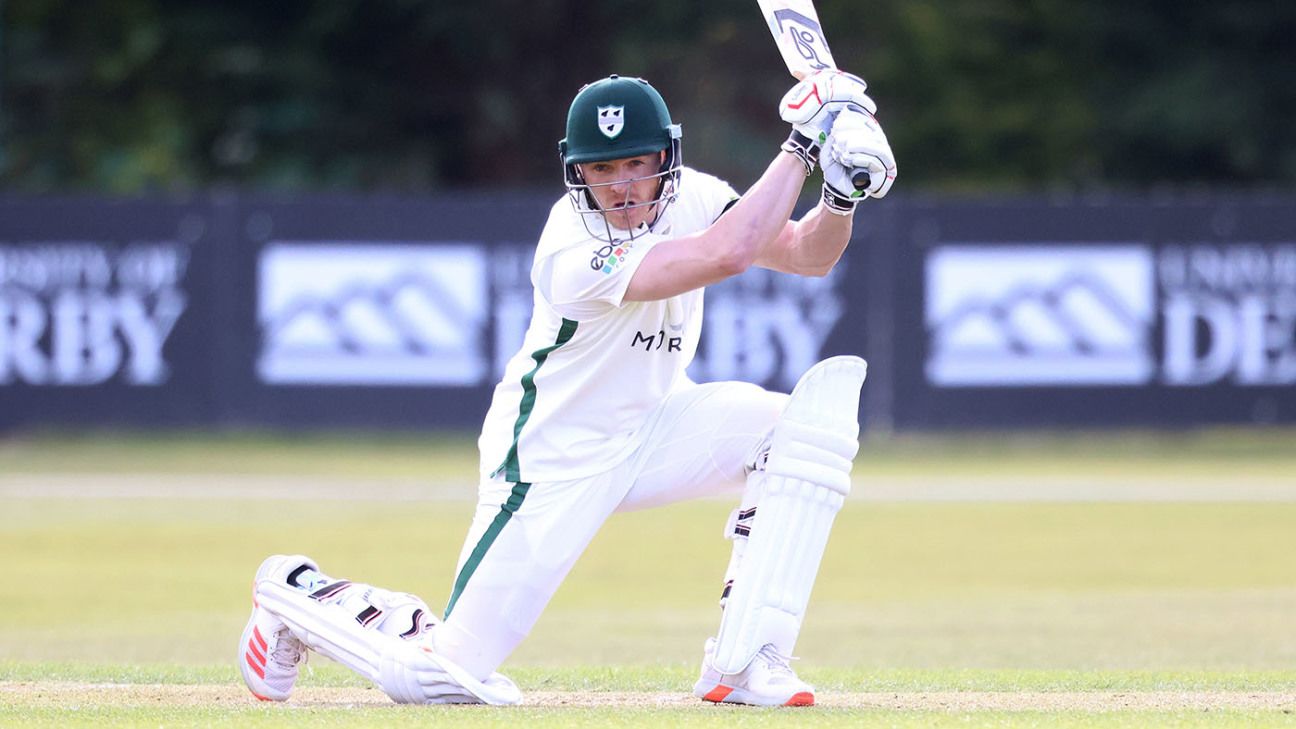Worcestershire 305 (Fell 69, Wessels 60, Critchley 5-67) and 193 for 8 (Cox 60*) drew with Derbyshire 390 (Critchley 109, du Plooy 98, Hosein 83*, Godleman 50) and 312 for 5 declared (Critchley 84, Madsen 66, Hosein 55*)
Derbyshire’s captain, Billy Godleman, spent the last two sessions off the field with a groin injury and a darkened room was an appropriate setting after his negative declaration contributed to his side’s failure to force victory against Worcestershire at The County Ground.
Only Essex, 29 years ago, had chased down a higher victory target than the 398 in 84 overs that Godleman set Worcestershire and thanks primarily to a defiant, unbeaten 60 from 148 balls from Ben Cox, Derbyshire were repelled at 193 for 8.
Derbyshire’s youthful pace attack meant that much of the onus rested with the legspin of Matt Critchley, but although he wheeled away from the City End for much of the day, he could not quite force victory on a slow surface and finished with 3 for 76 from 32.5 overs – and 8 for 147 in the match.
Worcestershire looked bound for defeat at 83 for 6, but they lost only two more wickets in the last 47 overs as Cox found staunch support from Ed Barnard and Joe Leach. Much of Worcestershire’s batting conviction comes down the order: this will not be the only time this season that they save their best songs until last.
The prospect that Jake Libby might drop anchor, following his marathon effort at Chelmsford a week earlier, would have been foremost in Derbyshire thoughts, so to remove both Daryl Mitchell and Libby in 16.5 overs before lunch was an uplifting beginning. Critchley had Mitchell caught at slip in his first over, but then failed to strike again until his 25th. Libby’s dismissal was a soft one as he played-on against Fynn Hudson-Prentice, whose medium-pace drew more variable boune than most, but not as much as Derbyshire would have expected, and not as much as Worcestershire found on the previous day.
That phase of play was ample for Godleman to decide that his groin injury would be better rested indoors. He had supplanted Wayne Madsen at first slip, but dropped a simple offering from Mitchell off Critchley’s third ball before plunging a long way to his right to atone for his error two balls later. When Gareth Roderick edged his first ball, from Hudson-Prentice, just in front of Godleman at first slip, his groin began speaking to him. He did not appear after lunch. And maybe not for some time.
The wickets might not have fallen Critchley’s way, but there were enough near misses to encourage him they would, with several refused appeals for catches at keeper or slip and fleeting hopes that he might run out Tom Fell when he dived to intercept Roderick’s straight drive.
The first two wickets after lunch were giveaways. Fell looked aghast when he pulled Hudson-Prentice to Ben Aitchison at deep square leg, and Brett D’Oliveira’s departure was even more of a gift as Hudson-Prentice was brought in at backward square and D’Oliveira obligingly popped a stray delivery into his hands.
That was the start of a run of 3 for 8 in 23 balls as Aitchinson twice seamed the ball back enough to have Riki Wessels and Roderick lbw. It was at that juncture that Worcestershire’s summoned a seventh-wicket stand of 85 in 32 overs between Cox and Barnard. Derbyshire hearts began to sink. Barnard had a few injudicious moments on the drive, but Critchley was drawing little response from a slumbering surface, briefly switched ends and sought out the footmarks from around the wicket with no avail. On the verge of the final hour, two googlies in successive overs then did the trick as Barnard and Alzarri Joseph fell lbw.
Michael Cohen, a diminutive South African, as fast bowlers go, was not suited by a slow surface and quickly came and went, without a wicket in the match. Only four overs were available with the second new ball and Madsen, whose discussions became increasingly prolonged, gave Connors and Aitchison one each without reward. Suitably, the last ball fell to Critchley, whose fine individual match had failed to force victory.
Only Godleman will know how much his delayed declaration was influenced by the rise in draw points this season from five to eight. The tinkermen of the English game rarely waste a season without fiddling with regulations for county cricket. A draw is now worth as much as 67% of the points awarded for a victory and the result will be more negative cricket.
Joe Root, an England Test captain heavily beaten in India, gave the tinkermen’s latest edict his blessing, suggesting that it would stiffen the resolve of county batsmen to fight for a draw when up against it. There was also the hope that it might prevent “result pitches” and premature self-congratulation is inevitable after the majority of matches produced tense finishes in the final session of the fourth day: only two games were drawn.
Derbyshire’s approach in the later stages of their second innings was overly cautious. An overnight lead of 353 was at least 20 runs lower than it might have been had they pushed admittedly young professionals for a greater degree of risk and it would have rid them of the need for further insurance on the final morning.
Instead, Derbyshire batted on for a further 38 minutes, adding 44 runs. Years of mediocrity can prey on confidence and invite caution, and Godleman also deserves that to be recognised, but even Essex, in achieving that record chase of 442 for 6 in 1992, needed 183.4 overs to do it.
David Hopps writes on county cricket for ESPNcricinfo @davidkhopps
